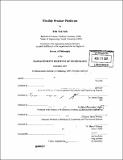Flexible product platforms
Author(s)
Suh, Eun Suk
DownloadFull printable version (10.27Mb)
Other Contributors
Massachusetts Institute of Technology. Engineering Systems Division.
Advisor
Olivier L. de Weck.
Terms of use
Metadata
Show full item recordAbstract
The research contributes to the uncertainty management of engineering systems by proposing and demonstrating a way to implement flexible platform strategy to respond to future uncertainties. In today's competitive market, where market segments are becoming more fragmented, pressure to develop and market diverse sets of products is increasing. To meet such market needs and reduce production cost at the same time, product platform strategy has been implemented in several different industries. Using a core set of common platform elements and variant-specific unique elements, a family of products can be produced to satisfy various market segments. However, the growing cost of platform development and undesired side effects of the strategy (e.g. performance tradeoff, cannibalization) is forcing companies to design their platforms with flexibility, so they can accommodate product variants, differentiate these variants, and be economically flexible to respond to specified future uncertainties. This thesis introduces a design process to architect flexible product platforms. The proposed process is demonstrated in two automotive application case studies. (cont.) In the first case study, a vehicle floor pan is designed to satisfy two different length requirements, while being economically robust to future specification change and component demand. The second case study investigates a vehicle platform, where the flexible body in white (BIW) platform is designed for a family of three vehicle variants through identification of critical elements subset. Results showed that the flexible BIW platform is less profitable than the inflexible BIW platform, but when the degree of future uncertainty increases, the flexible design eventually becomes more profitable. This research provides additional examples that yet again confirms the general proposition "flexibility gains value as the degree of uncertainty increases."
Description
Thesis (Ph. D.)--Massachusetts Institute of Technology, Engineering Systems Division, 2005. Includes bibliographical references (leaves 155-162).
Date issued
2005Department
Massachusetts Institute of Technology. Engineering Systems DivisionPublisher
Massachusetts Institute of Technology
Keywords
Engineering Systems Division.